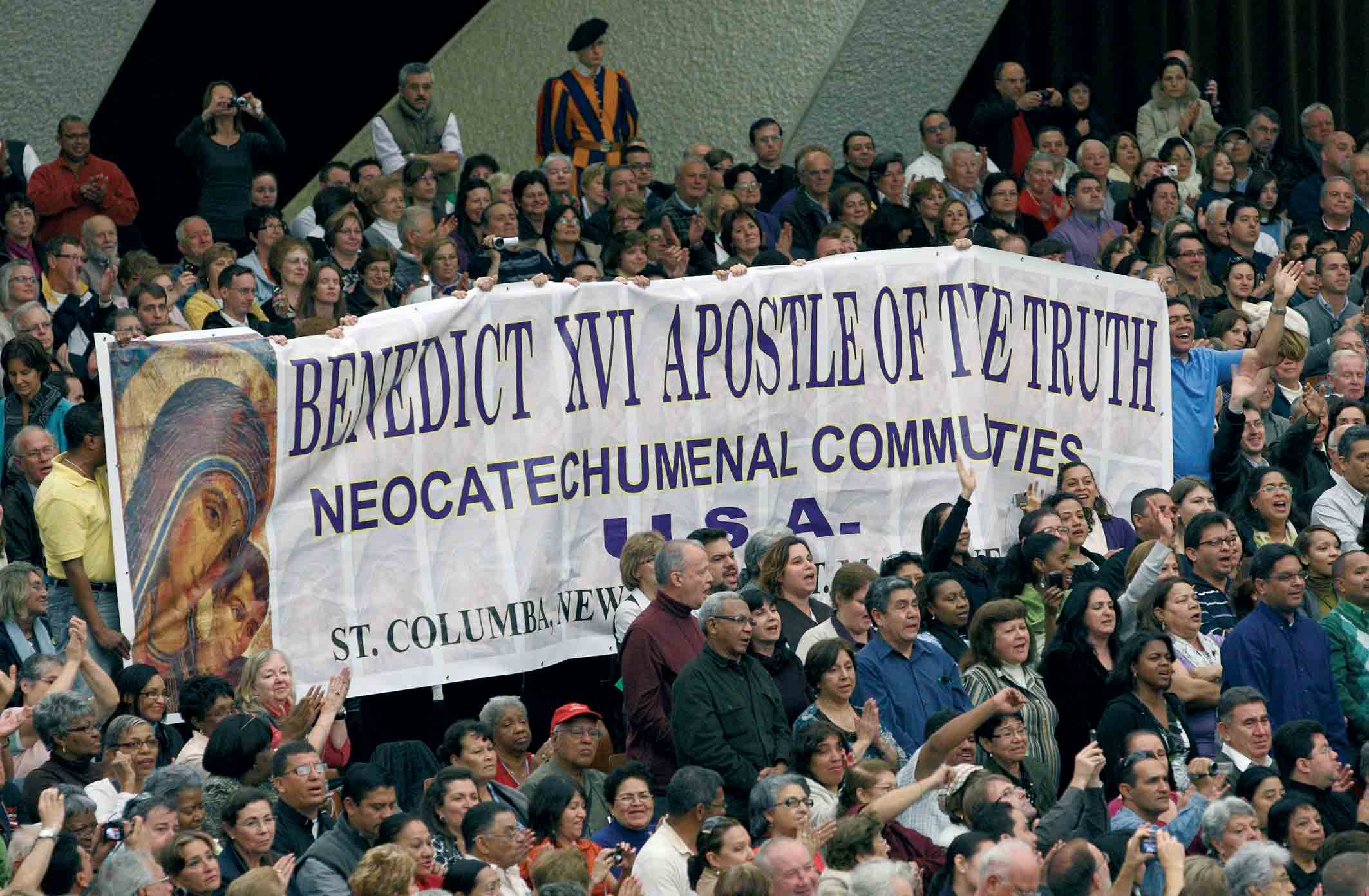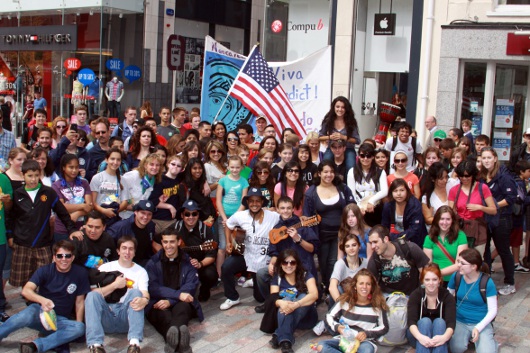 The founders of the Neocatechumenal Way are Kiko Arguello and Carmen Hernandez. The NCW was born in the poor. It did not come from the rich. Regarding the history of the NCW:
Two dynamic Spaniards are the founders of the Neocatechumenate movement: Francisco Arguello, better known as Kiko, and Carmen Hernandez, who once studied to become a nun .
Born in 1939, the "existentialist" Spanish painter Kiko did not start out as a practicing - or even believing - Catholic. On November 2, 1980, recounting his history during his meeting with Pope John Paul II in the Martyred Canadian Saints parish in Rome, he stated: "God permitted me to experience the absurd - atheism - until he had mercy."
Upon his conversion, Kiko began to frequent catechism courses, and for years he also trained as a catechist. Finally, convinced of Christ's presence among the poor, he went to live with the poor of the Palomeras Atlas shanty town in Madrid. In 1964 he started his "Way," following in the footsteps of Charles de Foucauld. At this stage, Kiko's sole possessions were a guitar, a crucifix, and a Bible.
It was among the poor of Palomeras that Kiko encountered Carmen Hernandez; they joined forces to establish the bases for what they would eventually call the Neocatechumenate Way. Carmen Hernandez, who held degrees in Physics and Theology, had already been teaching for nearly eight years in a religious missionary institute. While awaiting a missionary assignment Bolivia, she had been living an analogous experience to Kiko's. One of Hernandez' main concerns had been the liturgical reforms instituted by Vatican II.
In 1968, Kiko and Carmen came to Rome where, with the support of Rome's Vicar-Bishop Cardinal Angelo dell'Acqua, they first launched their movement in the Canadian Martyrs' parish.
The founders of the Neocatechumenal Way are Kiko Arguello and Carmen Hernandez. The NCW was born in the poor. It did not come from the rich. Regarding the history of the NCW:
Two dynamic Spaniards are the founders of the Neocatechumenate movement: Francisco Arguello, better known as Kiko, and Carmen Hernandez, who once studied to become a nun .
Born in 1939, the "existentialist" Spanish painter Kiko did not start out as a practicing - or even believing - Catholic. On November 2, 1980, recounting his history during his meeting with Pope John Paul II in the Martyred Canadian Saints parish in Rome, he stated: "God permitted me to experience the absurd - atheism - until he had mercy."
Upon his conversion, Kiko began to frequent catechism courses, and for years he also trained as a catechist. Finally, convinced of Christ's presence among the poor, he went to live with the poor of the Palomeras Atlas shanty town in Madrid. In 1964 he started his "Way," following in the footsteps of Charles de Foucauld. At this stage, Kiko's sole possessions were a guitar, a crucifix, and a Bible.
It was among the poor of Palomeras that Kiko encountered Carmen Hernandez; they joined forces to establish the bases for what they would eventually call the Neocatechumenate Way. Carmen Hernandez, who held degrees in Physics and Theology, had already been teaching for nearly eight years in a religious missionary institute. While awaiting a missionary assignment Bolivia, she had been living an analogous experience to Kiko's. One of Hernandez' main concerns had been the liturgical reforms instituted by Vatican II.
In 1968, Kiko and Carmen came to Rome where, with the support of Rome's Vicar-Bishop Cardinal Angelo dell'Acqua, they first launched their movement in the Canadian Martyrs' parish.
Their work soon aroused the interest of the Vatican's Congregation of the Liturgy and Sacraments. After a period of examination, the Congregation published a laudatory article in its official journal Notitiae.A few years later, the Congregation officially defended the movement against accusations of heresy by a group of traditionalist Canadian priests.
One of the Congregation's advisors wrote in his report: "I would like to point out another aspect of this catechesis, or rather Neocatechumenate Way. As a historical scholar of ancient catechesis, I can say that Kiko's and Carmen's endeavor to realize the Catechumenate for our times has been successful. Personal experience has allowed them to intuit the profound validity of Church institutions in the first three centuries, permitting them to translate these into a new structure, which assumes the most important elements of early Christianity, yet employs them in a new context: conversion of the baptized who never made the personal choice of faith... I find all of this positive, and thereby conclude my judgment by inviting the responsible members of the Sacred Congregation of the Clergy to encourage this movement, guiding it with comprehension and paternal indulgence, so that it remain as it is - a service to authentically renovate the parish communities."
Years later, on May 9, 1986, Kiko and Carmen were summoned by the Congregation for the Doctrine of the Faith to respond to a series of questions regarding their views on hermeneutics, pastoral work and doctrine. After thorough study of their responses, Cardinal Joseph Ratzinger informed them that his Congregation wished to assist them, and proposed linking the movement to a Vatican congregation to provide a juridical basis. Kiko and Carmen fervently desired the official support of the Holy Father. As a result, John Paul II nominated Bishop Paul Josef Cordes, Vice-President of the Pontifical Council for the Laity, to act as the Pope's delegate ad personam to the movement and intermediary with the Vatican Congregations.
On August 30, 1990, Pope Wojtyla sent Cordes a letter appreciating the Neocatechumenate movement's "correctness and good intentions" and recognizing the movement as "a Catholic path and initiative which is valid for our times."
http://www.christusrex.org/www2/ncw/english/movep.htm
God works in mysterious ways. From among many people, He chose Abraham, who was a pagan and an old man with no heirs. From this pagan, God turned him into the "father of faith" and a father of many nations. God chose Moses, a person slow of speech raised by Egyptians. From this stutterer, God made him the spokeman for His chosen people. God chose David, a young poor shepherd boy with no military skills. From his poor shepherd boy, God turned him into a king who conquered many people including the Philistine giant Goliath. God chose Saul, a Pharisee who persecuted Christians. God turned this persecutor into an Apostle of the Gentiles. And so we have Kiko Arguello, who started out as an unbelieving Catholic. Somehow God turned him into the Founder of the NCW, which was born in poverty. According to St. John Paul II:
Begun in the slums of Madrid, 30 years later it has become, like the Gospel mustard seed, a great tree which has now spread to more than 100 countries of the world, with a significant presence also among Catholics of the Eastern-rite Churches.
Like every anniversary, seen in the light of faith, yours too becomes an opportunity for praise and thanksgiving for the abundant gifts that in these years the Lord has granted you and, through you, to the whole Church. For many people the Neocatechumenal experience has been a journey of conversion and maturing in the faith through the rediscovery of Baptism as a true source of life, and of the Eucharist as the culminating moment in Christian life; through the rediscovery of the word of God which, shared in fraternal communion, becomes a light and guide for life; through the rediscovery of the Church as an authentic missionary community.
Like a small mustard seed from among the poor, the NCW grew into a huge tree. It's strength lies in the Holy Spirit who nourished it into growth. From the early days, the NCW has always been misinterpreted as a movement, but it is an itinerary of Christian formation.
Before starting their evangelizing activities, Kiko and Carmen asked themselves: where did the strength of the early Church lie, and what accounts for weakness in the modern Church? The answers are to be found in the "Neocatechumenate Way" they eventually mapped out: post-baptismal Christian initiation realized with the methods and forms of the early Church.
The Neocatechumenate movement has revolutionalized parish life in the churches to which it has been called. No longer do sociological criteria divide groups by age - children, adults, the elderly. Parishes rather become true communities of 30-50 individuals of diverse ages, social conditions, mentalities, and cultural backgrounds, growing together in faith and commitment. These communities act in the parishes with a "tripod" basis of catechesis (as suggested by Vatican II): Word, Liturgy, and Community.
For the Neocatechumenate movement, the Word implies the proclaiming of the Gospel (Kerygma) anywhere and everywhere; the Liturgy represents the celebration of Faith, within which all the symbols of tradition are remembered; and the Community (Koinonia) signifies the communion between those who have heard the Word and those who live in the unity of love under the sign of the Cross.
The Neocatechumenate community celebrates Mass with slight variations conceded by the Congregation of the Divine Liturgy and Sacraments (Note of December 19, 1988). After the three Scripture readings and before the homily, members engage in commentary, comparing their readings with their personal experiences. The homily then takes account of the observations made, corrects deviations, and stimulates reflection. Next, as in the Ambrosian rite, is the Rite of Peace. The rite of the Eucharist follows early Christian practices, using unleavened bread and wine.
The re-discovery of the liturgy has been a determinant factor in overcoming cynicism and indifference, especially affecting Catholics in the prosperous and comfortable Western world. At present, thousands of parishes have passed from a state of limited activity to one of florid growth thanks to the Neocatechumenate. (In Spain in recent years, there has been a 17.5% growth in parishes with Neocatechumenate leadership). Neocatechumenate communities have been able to overcome two serious problems in today's Church: defections among the young and among couples.
In the Roman diocese alone, where 25% of the parishes are Neocatechumenates, 50% of the members are persons 25-50 years - the age group most minimally represented in other Italian parishes. As for couples, the average birth rate in the Roman diocese is 3.11%, considerably higher than the national average of 1.2 children per woman.
The teachings of Kiko and Carmen are based on two main Scriptural passages. The first refers to love: "As I loved you, so you should love one another... By this love, all will recognize that you are my disciples" (John 13: 34-35).
The second passage refers to death. In Chapter 2 of the Letters to the Hebrews, it is taught that Jesus Christ has come to "destroy the mediator of death, the Lord of death, i.e. the Devil, and to free those, in fear of death, who were subjected to this slavery during life" (Hebrews 2: 14-15). This victory over death is the essential Christian message Jesus left us, and it is central to the teachings of the Neocatechumenate movement.






